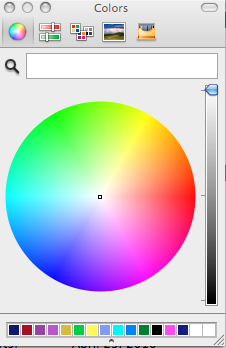The Way You Do the Things You Do
As a teacher, I am always intrigued by what people notice first. Reading Kevin Jarrett’s and Kim Cofino’s posts (one recent, one not-so) brought up a flood of ideas about the way I do the things I do and how other people sometimes look at me funny when they see things on my computer.
Teachers are professional observers of the way kids do the things they do, but we forget to notice the same about adults. First grade teachers pride themselves on analyzing the way a kid holds that fat pencil and helping him adjust it so the letters look better and the paper doesn’t tear. Swim coaches watch the way one arm enters the water and know that is why the swimmer rolls too far. Learning support teachers know that Doug or Lisa only “sees” words set off by white space or remembers words he/she says aloud but not the ones he/she hears. Geometry teachers look at how a student starts a proof and know where he/she is headed and what he/she sees first in that maze of triangles and line segments. We constantly analyze brain paths.
Why don’t we do the same when we help adults? The UI* “experts” (hired consultants to tell you your web site is badly designed) can tell you where people go first, click first, and get lost. They are the visual merchandisers in the mall of web pages. (Did you know that Americans almost always walk to the left when they enter a store?) Teachers are experts, too, but we forget to watch when we are trying to show another adult how we managed to make that web tool to do that or how to build a template in Google Docs. We need to remember that the way we do the things we do may not be the other guy does it, and he needs to recognize his own way.
 A year ago I reverted to an Mac computer after a ten year hiatus. Two months ago, my colleague made the same switch. She read manuals. I did not. She learns from print. I do just fine with print, but given the choice, I go for colors and images. I color code emails, folders, fonts…everything. (I would probably color code people in a room if I could figure out how. Unfortunately, I remember new people first by the colors they were wearing — a real liability since they tend to change clothes!) Color and position have greater impact than text on the way I do the things I do. My colleague wants to write thorough, sequenced explanations of any how-to. She, like most teachers, uses words as her primary means of communication. I certainly talk enough, but I figure things out visually. Then I translate them into words orally, and finally into writing. So when it is time to teach OK2Ask sessions to other teachers, my plan is visual at the start. I want to SHOW things with colorful cues. But I know there are adults who don’t notice color. They are looking for magic words like “start” or “go.” That’s the way they do the things they do. Kim’s second graders in her post had no fixed way to do the things they do because they were young and flexible. She helped them notice their ways. We need to help adults notice, especially if they are accustomed to what seems like random clicking followed by failure.
A year ago I reverted to an Mac computer after a ten year hiatus. Two months ago, my colleague made the same switch. She read manuals. I did not. She learns from print. I do just fine with print, but given the choice, I go for colors and images. I color code emails, folders, fonts…everything. (I would probably color code people in a room if I could figure out how. Unfortunately, I remember new people first by the colors they were wearing — a real liability since they tend to change clothes!) Color and position have greater impact than text on the way I do the things I do. My colleague wants to write thorough, sequenced explanations of any how-to. She, like most teachers, uses words as her primary means of communication. I certainly talk enough, but I figure things out visually. Then I translate them into words orally, and finally into writing. So when it is time to teach OK2Ask sessions to other teachers, my plan is visual at the start. I want to SHOW things with colorful cues. But I know there are adults who don’t notice color. They are looking for magic words like “start” or “go.” That’s the way they do the things they do. Kim’s second graders in her post had no fixed way to do the things they do because they were young and flexible. She helped them notice their ways. We need to help adults notice, especially if they are accustomed to what seems like random clicking followed by failure.
What do you notice first in the produce section of the grocery store? Colorful fruit? Signs with prices? The words “Bonus Buy”? When you open your email, what do you notice first? Names? Dates/Times (numbers)? Red alerts or boldface? Are you an icon person or a label person? Are you a menu person or a drag-it person? If your computer (or Google Docs) folders were color coded, would you remember better where you put things? When you explain where to click do you say “click Save” or “click on the blue button in the top right to save”? How do you do the things you do? How does the way you do the things you do affect the way you help the adults you help?
[This post is captioned for GLL (Geek Language Learners) *UI= Geek speak for “user interface” or how-people-click-and-do-things.]





